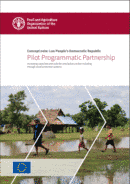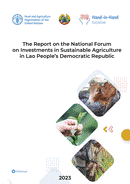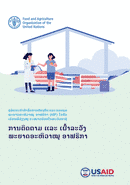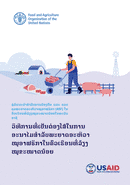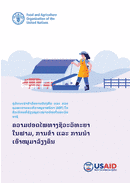Publications
Extreme weather events are increasing in frequency and intensity due to climate change, while conflicts are driving consistent and unsustainable increases in humanitarian needs. Combined, they are pushing acute hunger to new heights reaching a five-year high in 2020.
A strategic shift from responding to predictable shocks to anticipating their impacts has the potential to break the cycle of growing dependence on humanitarian aid. This approach - commonly known as anticipatory action - establishes risk-monitoring systems linked to flexible finance and standard operating procedures by delivering support to protect people’s lives and livelihoods ahead of forecast shocks.Anticipatory action can be delivered through a variety of modalities, including through national social protection systems. Social protection systems consist of policies and programmes designed to address economic, environmental and social vulnerabilities to food insecurity and poverty. Linking anticipatory action to social protection means making better use of existing infrastructure to reach and proactively support vulnerable populations ahead of forecasted shocks.Recognizing the clear effectiveness of this approach, the Directorate-General for European Civil Protection and Humanitarian Aid Operations (DG ECHO) established a three-year pilot partnership with the Food and Agriculture Organization of the United Nations (FAO) to explore and strengthen the critical link between these two approaches. This concept note unpacks the activities for Year 1 of this partnership in Lao People’s Democratic Republic.
The Food and Agriculture Organization of the United Nations (FAO) and the Ministry of Agriculture and Forestry (MAF) of the Lao People's Democratic Republic held a National Forum on Investments in Sustainable Agriculture in April 2023. The event aimed to gather key stakeholders, including government ministries, development partners, and private sector companies, to discuss leveraging investments for sustainable agriculture under the Hand in Hand Initiative (HIHI). The report highlights the rationale behind FAO's engagement with the private sector, as well as the development of HIHI and the results of the Investment Forum in Rome. The report also explains the purpose of the National Investment Forums, which are being held in all HIHI countries prior to the second edition of the Rome Investment Forum. The National Forum in Lao PDR was designed to gather all key stakeholders and trigger a dialogue process, with FAO acting as an honest broker.
This guideline provides guidance for government officials in defining surveillance objectives, establishing ASF-related case definitions and reporting criteria, providing examples of potential ASF surveillance methods, identifying various crucial factors in consideration of a surveillance system, and evaluating a surveillance system.
This guideline outlines the principles of an ASF clean chain system for smallholder pig producers in Southeast Asia. It provides recommendations on the practical application of good biosecurity management practices combined with traceability in smallholder pig systems necessary for the continued production and supply of commodities along the pork value chain irrespective of the prevailing ASF virus risk situation.
This guideline provides information on biosecurity, slaughtering and restocking practice in smallholder pig farming system which are designed for use by national and/or central veterinary authorities, farmers and relevant stakeholders, especially focusing on Southeast Asian pig industry.

